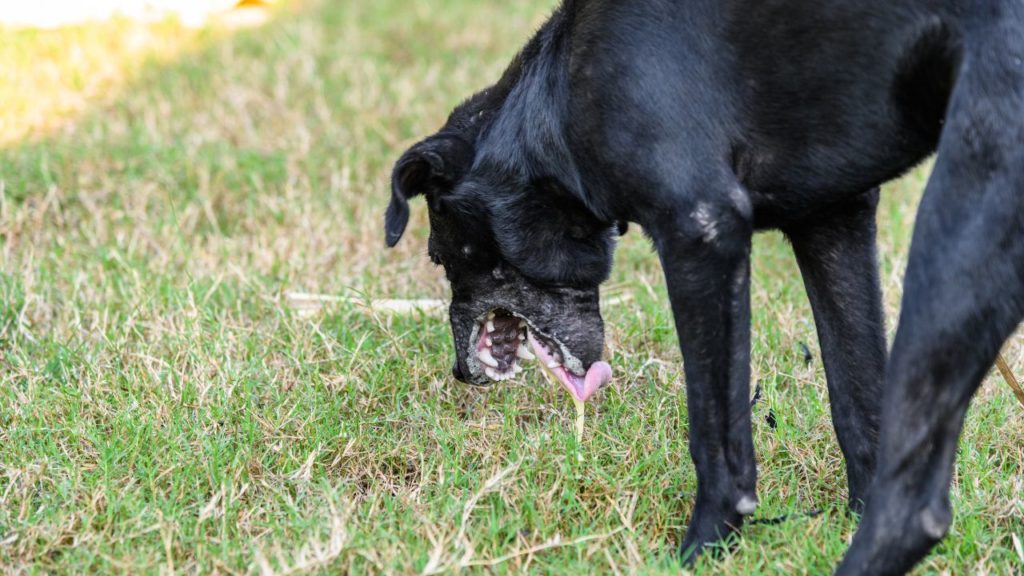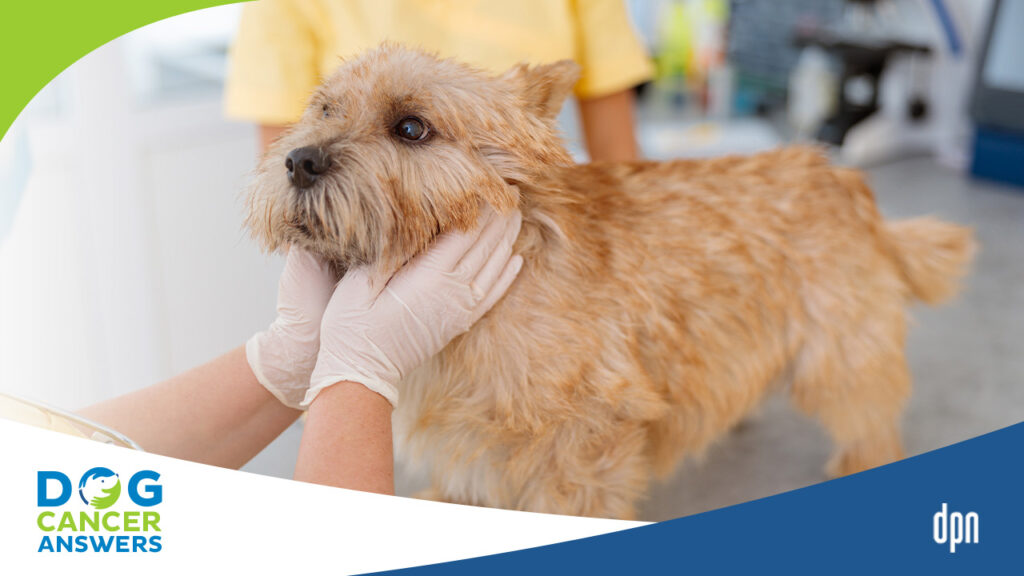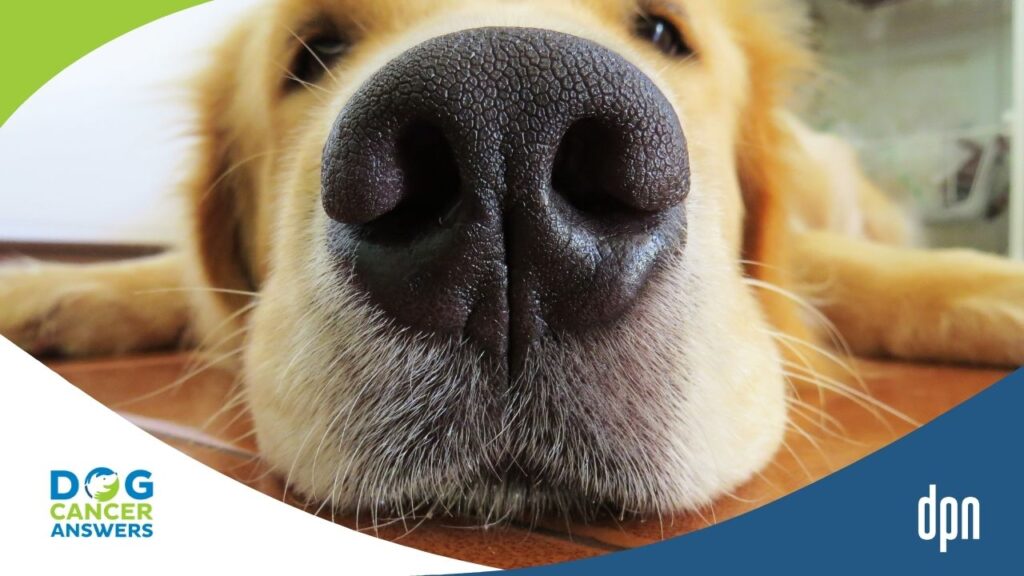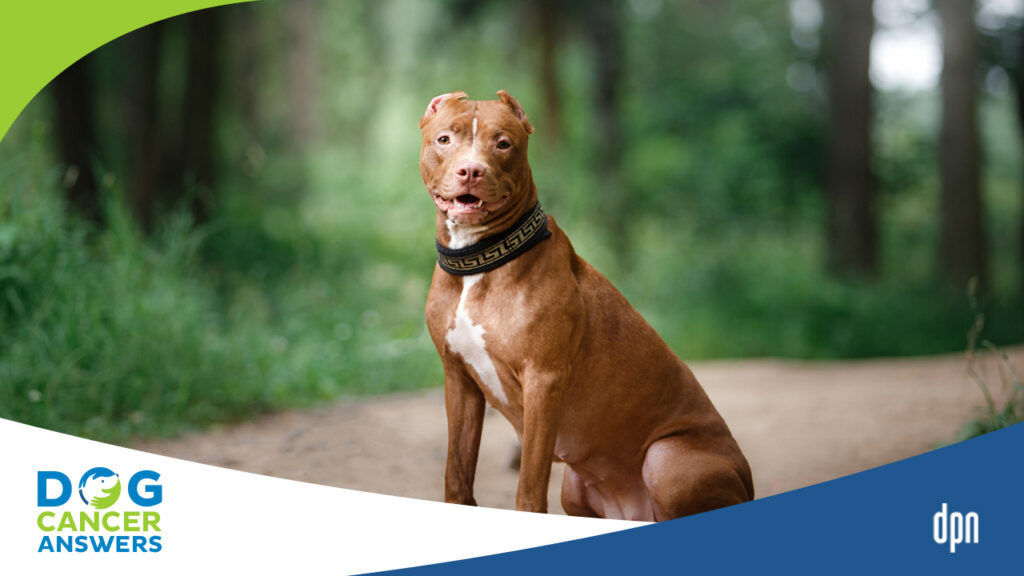EPISODE 149 | RELEASED January 10, 2022
Dog Vomiting: Should I Call My Vet? | Dr. Nancy Reese Deep Dive
Dr. Nancy Reese weighs in on when vomiting is a concern and what you and your vet can do about it – especially if your pup has cancer.
SHOW NOTES
Vomiting can be caused by a variety of things, ranging from eating garbage to a serious illness. It can also be a side effect of chemotherapy treatment.
In most cases, vomiting once isn’t a big concern. If the dog vomits multiple times within a single day, vomits for several days in a row, or has other symptoms of illness in addition to the vomiting, it’s time to seek veterinary care.
Dr. Nancy discusses several different treatment options depending on the underlying cause of your dog’s vomiting. Cerenia (maropitant) is great for preventing nausea, while some over-the-counter antacids can combat stomach acid overproduction. And making sure your dog stays hydrated is always a good step for health!
[00:00:00] >> James Jacobson: Our sponsor today is the most helpful book for anyone dealing with dog cancer, the Dog Cancer Survival Guide written by doctors Demian Dressler and co-author Dr. Susan Ettinger, also known as Dr. Sue Cancer Vet. Together they outline the full spectrum approach to dog cancer. It includes everything that has been shown to help your dog fight cancer, even strategies usually thought of as outside the box. That’s The Dog Cancer Survival Guide.
[00:00:31] >> Dr. Nancy Reese: But vomiting, particularly if it goes along with other signs – so if the animal looks depressed, or its gum color is pale, or it seems uncomfortable, or worse yet if their belly looks distended, those are usually ones that we’re going to get in right away.
Even if it’s only one vomiting, if there’s discomfort and distended belly, that animal comes in right away.
[00:00:56] >> Announcer: Welcome to Dog Cancer Answers where we help you help your dog with cancer. Here’s your host, James Jacobson.
[00:01:04] >> James Jacobson: Hello friend. Today, we are going to talk about a glamorous topic that most dog lovers are quite familiar with: vomiting. To help us figure out when vomiting is a concern, and when it’s just a bunch of stomach upset, we’re joined once again by Dr. Nancy Reese. Dr. Nancy is a veterinarian with over 30 years of clinical practice experience, and she also boasts a Master’s Degree in Preventative Veterinary Medicine and a PhD in Epidemiology. Dr. Nancy, thank you so much for being with us today.
[00:01:40] >> Dr. Nancy Reese: Thanks again. It’s nice to be back.
[00:01:42] >> James Jacobson: So we’re talking about barf today. Vomit. Throw up. When do you call your vet? When should I panic if my dog throws up?
[00:01:53] >> Dr. Nancy Reese: So, funny question, because it seems like it would be such a straightforward answer. These things happen, call your vet. But I find there’s so much subjectivity when people give a description of a dog’s symptoms, that it can be really hard to parse out whether it’s an actual emergency or not.
So I can think of a case, this isn’t about vomiting, but literally we had on the same day, two people describe their dogs’ eye situation, and they sounded exactly the same on the phone. The dogs get there and one’s a super minor condition and the other one is about to lose the eyeball. So it’s so tough when you talk about a symptom as when it becomes an emergency.
So if you are uncomfortable with the symptom that your dog is showing, then you should call us. But that being said, vomiting is a super common thing in dogs. One time vomit, the dog got into something, threw up once, I’m not generally going to be concerned about that. But that same dog vomits three or four times in the same day, or he’s looking uncomfortable, he’s you know, not wanting to move around or might even be moaning – that’s a much bigger concern than, always using the Lab as an example of simple things, but a Lab throws up and is still wagging his tail running around. That’s not going to be an emergency.
[00:03:19] >> James Jacobson: So how much vomiting is too much? You say three or four times. That’s sort of the thing like, oh, this is, this is an issue.
[00:03:26] >> Dr. Nancy Reese: I think that usually has me more concerned. If there’s repeated bouts of-
[00:03:30] >> James Jacobson: So one or two, not so much.
[00:03:32] >> Dr. Nancy Reese: Right. Right. And then it might also depend on the length of time that this has been going on. So if a dog has been vomiting once a day for two weeks, okay, obviously we need to do something about that because that’s going on too long.
But if it’s once a day, but it’s only happening once every other week, again, I may not be as concerned. So it’s the frequency and the duration of the sequential episodes that becomes more important, or secondary signs. A dog who’s vomiting and no longer wants to eat, that’s usually a little bit more concern than a dog that vomits and is right back at its food bowl.
[00:04:11] >> James Jacobson: Got it. Well, let’s talk about the – this reminds me of our poop episode – let’s talk a little bit about some of the things that you can discover in the vomit. There’s obviously different types of vomit. They look different. What do you look for?
[00:04:27] >> Dr. Nancy Reese: Right. So going back to the bloody poop talk, blood in the vomit, that’s also another big concern because that can be something a bit more severe. So I definitely don’t like to see dogs that have blood in their vomit. So looking for color is certainly important. Another thing about consistency, there’s quite a different list of causes for things that are regurgitated versus vomiting.
[00:04:51] >> James Jacobson: Break that apart. What’s the difference between those two?
[00:04:54] >> Dr. Nancy Reese: So, yeah, in general, vomiting, tend to worry about a little bit more than regurgitation, but again, regurgitation can actually have some bad things causing it underlying.
So if an animal is regurgitating frequently, that still is a big concern, but an occasional regurgitation, undigested food comes out, I usually don’t worry. But vomiting, particularly if it goes along with other signs – so if the animal looks depressed, or its gum color is pale, or it seems uncomfortable, or worse yet if their belly looks distended, those are usually ones that we’re going to get in right away.
Even if it’s only one vomiting, if there’s discomfort and distended belly, that animal comes in right away.
[00:05:40] >> James Jacobson: What is the presumption with the distended belly?
[00:05:43] >> Dr. Nancy Reese: Uh, so either fluid filling up in there, or something like bloat, which is an air filled surgical emergency, and those are really dire cases. So oftentimes the history with that might be dry heaving with a big tight belly.
And those animals come in as soon as possible and usually get referred down for surgery. So belly size, especially if it’s a change, now we get a lot of people that say their dog’s abdomen is swollen, and then we ask, is this a new thing? And they say, no, it’s always like that. Then we don’t really worry about that as a, as an emergency sign.
[00:06:17] >> James Jacobson: Got it. Well, in our online community, DogCancerSupport.com, several people have noticed vomiting and they’re concerned that vomiting is, in a dog that is healthy, that maybe just because they’re super cancer aware, does vomiting suggest that maybe there’s a cancer problem?
[00:06:35] >> Dr. Nancy Reese: I would say there’s probably more non-cancerous causes of vomiting than cancer causes.
So, you know, especially if it’s just the intermittent thing, but again, not hard and fast rule, but I worry about cancers particularly if we have a lot of weight loss and the animal’s vomiting. That’s, you know, getting into the trash, even if they’re not eating for a couple of days, won’t cause an animal to lose a lot of weight.
It takes significant disease to lose a lot of weight. So cancer’s always big when there’s unexplained weight loss.
Got it.
[00:07:09] >> James Jacobson: You talked about bloat, and you talked about, you know, things that could be super serious. And of course this will only happen during non-business hours for veterinarians.
[00:07:18] >> Dr. Nancy Reese: Oh absolutely.
[00:07:18] >> James Jacobson: So is this considered an emergency? Is this something you want to go to the 24/7 clinic for? Or can you wait for a normal appointment and how do you know which to do?
[00:07:28] >> Dr. Nancy Reese: So a lot of that does depend on knowing your dog. If it looks uncomfortable and vomiting, and that animal is really lying around, or it’s been vomiting enough where it can be dehydrated, then yes, that is worth an emergency visit. Vomiting with diarrhea, they’re gonna get dehydrated twice as fast. So that’s another case where yes, an emergency visit is worthwhile.
[00:07:51] >> James Jacobson: And what are the visual symptoms of dehydration?
[00:07:54] >> Dr. Nancy Reese: Couple of reasonable ways – it’s a little hard in dogs versus cats – but you can kind of pick up the skin behind their shoulder blades, and if you make a little tent and let it go, it should snap back immediately.
If it goes a little slow, that’s a sign of significant dehydration. You can also push on their gums and if it feels kind of dry and tacky, that’s another sign that they might be dehydrated, versus a nice slobbery animal, it’s going to be very moist. Sometimes, if the dehydration gets bad enough, you’ll start to see their eyes will be a little bit sunken and their, their skin will look like it’s kind of sticking to the underlying tissues instead of moving comfortably.
[00:08:40] >> James Jacobson: We are gonna take a short break here to pay some bills. And then when we come back, we will discuss how vomiting can be related to cancer. Stay tuned.
Let’s go back to dogs that do have cancer, which is obviously a lot of folks who are listening to us now, is vomiting a more urgent situation in a dog with cancer than an otherwise healthy dog?
[00:09:05] >> Dr. Nancy Reese: I would always take that as a more significant sign, if we know the animal has cancer. Now it might just be a matter of it’s the medication they’re being given and it might not be as serious, but if the animal is on side effect medications, so we’re trying to be preemptive with cancer treatments about giving anti vomiting medications, so a dog that’s on those and is vomiting, that’s usually a significant concern because those medications should be suppressing it.
And if it’s a bad enough cause to overcome those medications, then it’s definitely a bit of a worry.
[00:09:40] >> James Jacobson: Because obviously a lot of chemotherapy drugs do, you know, oral chemotherapy, they may be giving at home, do have a potential for increasing nausea and vomiting.
[00:09:50] >> Dr. Nancy Reese: Absolutely. It’s, sadly it’s one of the most common side effects, but if we’re trying to be more preemptive and have medications on hand for that, you know, maybe on the days they get their chemo, they get anti-vomiting medications for a couple of days.
So yeah, if you’re not using the medications and the animal vomits, we might say, just give the anti-vomiting medication.
[00:10:12] >> James Jacobson: ‘Cause the give you the medicines, you know, to use this just in case, but it’s like you have a whole pharmacopia sitting on your kitchen shelf and it’s like, ah, I’ve got one more. So use it. It’s not just there for window dressing.
And these are called, uh, emetics, right? Is that what?
[00:10:26] >> Dr. Nancy Reese: Antiemetics.
[00:10:27] >> James Jacobson: Anti. Well, you see why I’m not a veterinarian. Okay, so antiemetics.
[00:10:32] >> Dr. Nancy Reese: We do have emetics too. But we try not to use those.
[00:10:34] >> James Jacobson: I don’t want to induce vomiting. Okay. So these are antiemetics. And what are some of the common ones that a vet would prescribe?
[00:10:41] >> Dr. Nancy Reese: Cerenia is probably the biggest one. It has a pretty good mechanism for controlling vomiting associated with things like chemotherapy and other sources of, of nausea.
We used to use Reglan or metoclopramide a lot. That doesn’t seem to be as effective for vomiting as Cerenia. So it’s, there may be certain cases where that’s desired, but in general, Cerenia is a better one. And then Ondansetron is another one, that’s a human medication, I think the brand name might be Zofran, but that’s another common anti vomiting medication that’s used.
[00:11:18] >> James Jacobson: Are there any over the counter things that you can just have on hand to give your dog if, if you’re seeing vomiting?
[00:11:25] >> Dr. Nancy Reese: Well, sometimes you use things, I mean the old things like Pepto-Bismol or Pepcid, some of the antacids. Those aren’t true anti vomiting, but they help maybe a little bit with nausea. So as a prelude to vomiting, there’s often a nausea period, and those might have some benefits, but they’re certainly not as effective for vomiting as something like Cerenia.
[00:11:48] >> James Jacobson: Got it. Now, because, you know, because I have a vet on the line, let me ask you this question. Sometimes, not recently, but sometimes my dog in the morning, during our morning walk, when her belly was empty, would vomit, but it was just sort of bile, it was just a little bit of yellow because there was nothing in her stomach. A cause for concern?
[00:12:06] >> Dr. Nancy Reese: Usually not. I mean that that we think that animals get acid reflux a lot like people do. So they eat their dinner at night and then they lie down for, you know, say 12 hours or so. And that acid can kind of leak up and irritate the esophagus. So, first thing in the morning when they get up, they feel that irritation and they’ll do a little bit of that vomiting.
So it’s distressing but usually not that concerning, and some different feeding regimes can sometimes help that, having a morning and evening feeding, or I’ve used uh, antacids or things like that to try to help prevent that.
[00:12:43] >> James Jacobson: Well my dog has figured out that if you do that, and then you do that in a day or two, then before you go for a walk, you get a treat. And then that settles the stomach. So she’s trained me really well, so-
[00:12:54] >> Dr. Nancy Reese: Absolutely.
[00:12:55] >> James Jacobson: I think that’s great because as soon as that happened, she would just do it and then look up like, okay, I’m done, I’m fine. So really, again, as we’ve talked about on so many episodes of Dog Cancer Answers, it’s important to know your dog.
What else do we need to understand about vomiting?
[00:13:11] >> Dr. Nancy Reese: I guess another thing that we didn’t mention that is often, uh, a concerning sign – if a dog is vomiting up water. So not the kind of dog that – again, going back to the Lab that I use for my example for everything normal – if a Lab goes, runs up to the bowl, drinks a ton of water, and that comes out, not gonna worry about that as much. But an animal that has drank water earlier and then starts throwing up that water, that can be a sign that things are not, even water can’t make it through the digestive tract. And that’s, that’s usually a bad sign as well. So vomiting water I definitely don’t like, unless it’s just right after they just tanked up.
[00:13:49] >> James Jacobson: Got it. Well, Dr. Nancy, Reese, thank you so much. I appreciate your time.
[00:13:54] >> Dr. Nancy Reese: Thank you. It’s always fun to talk about barf and poop.
[00:13:56] >> James Jacobson: We cover the fun stuff here on Dog Cancer Answers.
[00:13:59] >> Dr. Nancy Reese: Nothing but the best.
[00:14:01] >> James Jacobson: And I want to thank you for listening today. So if your dog just throws up once and is otherwise happy and seems fine, it’s probably nothing to worry about. But if your dog throws up multiple times in a day or is also acting sick, well then it is time to call the veterinarian. And while vomiting is not a common symptom of cancer, if your dog already has cancer, then throwing up can be a bit of a concern. So I want to thank you for joining us today, and I want to encourage you to subscribe to this show in your favorite podcast app or on YouTube. And of course you can always visit us on our website at DogCancerAnswers.com. Thank you for listening. I’m James Jacobson. And from all of us here at Dog Podcast Network, I’d like to wish you and your dog a very warm Aloha.
[00:15:01] >> Announcer: Thank you for listening to Dog Cancer Answers. If you’d like to connect, please visit our website at DogCancerAnswers.com or call our Listener Line at (808) 868-3200. And here’s a friendly reminder that you probably already know: this podcast is provided for informational and educational purposes only.
It’s not meant to take the place of the advice you receive from your dog’s veterinarian. Only veterinarians who examine your dog can give you veterinary advice or diagnose your dog’s medical condition. Your reliance on the information you hear on this podcast is solely at your own risk. If your dog has a specific health problem, contact your veterinarian.
Also, please keep in mind that veterinary information can change rapidly. Therefore, some information may be out of date. Dog Cancer Answers is a presentation of Maui Media in association with Dog Podcast Network.
Hosted By
SUBSCRIBE ON YOUR FAVORITE PLATFORM
Topics
Editor's Picks
CATEGORY











